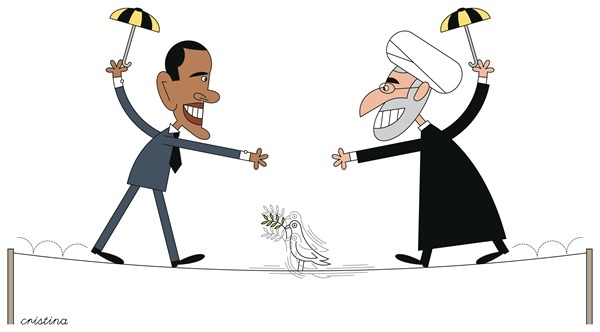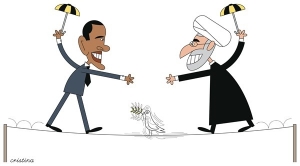Georgia’s Economic Prospects as Iran Re-Enters the World Economy
Last week, The United States lifted sanctions on Iran thanks to its compliance with the recently negotiated agreement on its uranium enrichment program. The deal was the hallmark of the Obama Presidency’s diplomacy, the world is now seeing one of the largest and most lucrative Eurasian economies re-enter the fold after years of isolation. Given that Georgia’s external economic relationships are shaky at best, given the recent economic crises in Russia and Greece, how then will the re-entry of Iran to world trade affect Georgia, oil prices, and regional power structures? For anyone, whether they be in Teheran, Tbilisi, or Moscow, looking for a silver bullet to their economic woes, this event will not be it; however, we will certainly see some realignment in the status quote that will likely prove to be noteworthy. It should be noted that Western relations with Iran are still tense and the present agreement only lays out the potential to be more cooperative. Should each set of interests be able to walk this path without major diplomatic spats, the outcome should be beneficial for all involved. The first major test in this regard was when Iran detained several US Navy sailors this last week for apparently straying into Iranian waters. The sailors were promptly released and apologies were exchanged on both sides, so it seems that cooler heads are prevailing; a rare move for major powers in Eurasia.
The greater geopolitical implications of Iran’s re-entry to the world market are notable, if not profound. A July 2015 futures report by the World Bank predicted that Iranian oil and gas hitting the market would drop prices by $10-$15. Right now oil is slightly above or below $30 depending on the day you might be reading this. It is highly unlikely that Iran alone would cause the entire world’s energy prices to fall by 50% (the World Bank report was published when prices were around $50-$55), but excess Iranian supply will most certainly not cause prices to rise. For Eurasian powers like Russia and Saudi Arabia who are so heavily dependent on energy prices for economic performance, this is exceptionally bad news. In a more long-term analysis, a benevolent energy-trading Iran offers European consumers an alternative to Russian oil and gas. In this regard Georgia’s geographic presents an opportunity to profit from being a conduit for this newfound trade between East and West.
In a somewhat prophetic policy brief entitled “A Western Strategy for the South Caucasus,” from the Central Asia Caucasus Institute from Johns Hopkins University, the authors mentioned how both Western powers and South Caucasian governments are stuck in the past when it comes to their regional priorities and have not, “balanced [democracy promotion] with equal attention to security and economics, and have not adapted their methods to the evolving realities of the region.” Iran perfectly personifies this “evolving reality.” The energy-rich country will be looking for markets to sell its oil and gas, and Europe is looking for any sourcing for energy that is not Russian. Right between these two opportunities is Georgia, which the Johns Hopkins paper calls the “land Suez” between the Caspian Sea Basin and Europe for its potential for massively-profitable over-land trade between the two markets. This trade, in the context of Iran, is manifested in two ways: Iranian energy going westward, and European light-industry going eastward. Put simply, Iranians, rich off energy profits, want to buy European cars, tea kettles, and furniture. Europeans want cheap gas for their cars that is not subject to the price shocks of a Russian supply controlled by a fickle Vladimir Putin. The question then turns to Georgia, and how it can structure policies to ensure its place as the trade corridor.
Georgia’s economic relationship with Iran over the past decade has been guarded at best. However, it would be well served to jump on the Persian bandwagon this year, given that Georgia’s Western allies are less terse when it comes to trading and interacting with Tehran. What then can the Georgian government do in this evolving world of Eurasian economic realities and relationships? First, Georgia must know where its comparative advantages lie and use them to its benefit. It will never be a competitor to Iranian and European light industry or agriculture. However, it is a burgeoning tourist destination; an increasingly bright beacon to middle class individuals from the East and West who have money to spend in the summer. Where Europeans may come to Georgia to hike, Iranians may come to Georgia to gamble and consume wine (or anything alcoholic) both of which are still banned in their country. Iranian tourists represented a maximum 2% of the total market share year-on-year in Georgia from 2005-2014 according to Geostat. This is one place where concerted government effort and marketing in Iran can bring a nice windfall of cash to Georgia in 2016-17. Additionally, the Iranian upper class will be looking for places to spend their newfound capital in the coming years. According to the same Geostat statistics, Iranian Foreign Direct Investment into the Georgian economy leaves much to be desired in the last decade. With regards the previously mentioned potential to be a “land Suez” between Iran and Europe, the government should be moving to create favorable tax structures to incentivize such trade. An example would be allowing energy to transit cheaply, but profiting from the transit of consumer goods and light industry such as automobiles. There is no doubt that with a concerted government effort, and no more diplomatic backlash from Georgia’s European and American allies, Iran’s newfound economic freedom could potentially bring a lot of money to Georgian pockets in the coming decade.
Charles Johnson
Cartoon by Cristina Sampaio/Cagle.com












